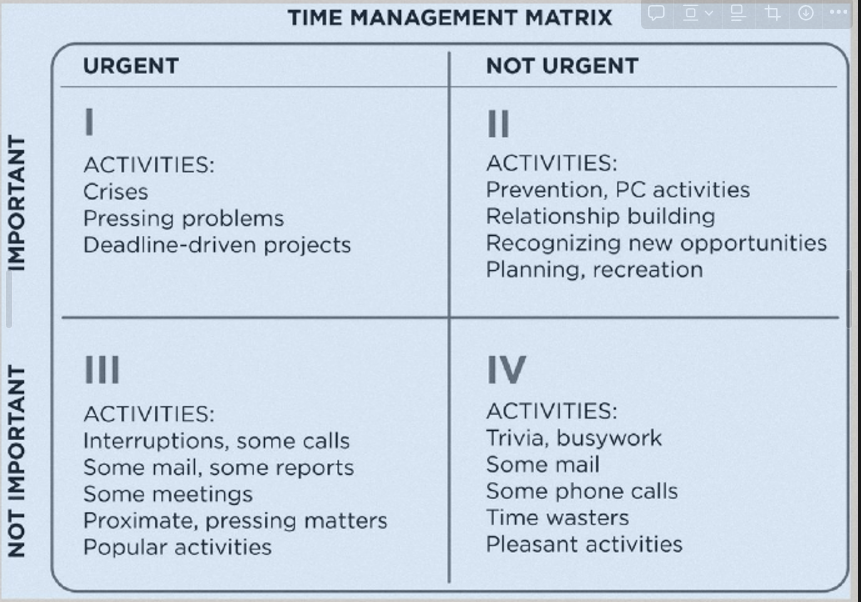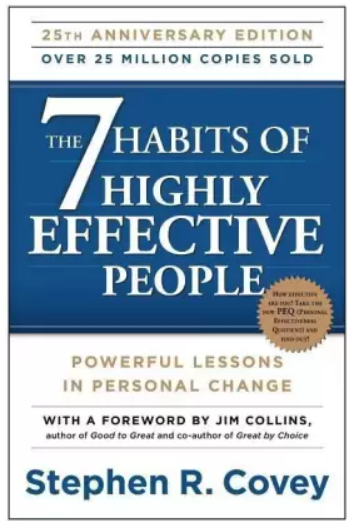With the aim of completing 12 books in a year, I have recently completed a book called “The 7 Habits of Highly Effective People” and here is my review of the book.
🔥 🚀 The Book in 3 Sentences
- Take an inside-out approach Win internally first. conquer the inner demons. Your prime focus should be to improve yourself first.
- Once you have won inside, you should try to connect with others effectively. value the difference and find an effective alternative, a higher solution.
- You must practice all the mentioned 7 habits regularly and consciously. Our effort should be more on sharpening the saw. It would only ease cutting the tree, quicker.
🎨 Impressions
- The book is a revelation. The word habits can make you compare this book with the Atomic Habit book. I felt that AH is a book that can teach you what habits you must follow as an individual. However, this book will teach you the habits of a good character. This book distinguishes between behavior and character very clearly.
👤 Who Should Read It?
Everyone is willing to put an effort into being more efficient in any aspect of life.
☘️ How the Book Changed Me
- I learned the meaning of being proactive. I learned the story of Viktor Frankl – a man in the Nazi concentration camp who refused the get hurt by nazi soldiers. As Eleanor Roosevelt observed, “No one can hurt you without your consent.” In the words of Gandhi, “They cannot take away our self-respect if we do not give it to them.” It is our willing permission, our consent to what happens to us, that hurts us far more than what happens to us in the first place.
- The concepts of center of influence and center of concern were amazing. I started to see every situation either as my concern area or an influence area. I wanted to ensure that consciously I am focussing my efforts on the center of influence rather than worried about my center of concern. The book taught me how to be part of a solution rather than be a problem. Be a model rather than a critic.
- Reading their autobiography into other people’s lives- I have stopped saying oh I know how you feel. I have essentially stopped reading my autobiography into other people’s lives. When conversing, I have made an effort to ensure I am listening to them, with intent to understand and not just to nod.
- Emotional Bank Account – This concept was brilliant to understand. just like any $ bank account, we all maintain an emotional Bank account. Every time we break a commitment, we are withdrawing from that bank account. we start feeling a little less trustworthy of the person. Every time a person helps you out in need, he makes deposit in your emotional bank account. If we think of each transaction of feelings through this bank account balance lens, we will realize areas of improvements needed for each of our relationships.
🔥 ✍️ My Top Quotes
- “For every thousand hacking at the leaves of evil, there is one striking at the root.” We can only achieve quantum improvements in our lives as we quit hacking at the leaves of attitude and behavior and get to work on the root, the paradigms from which our attitudes and behaviors flow.
- Leo Roskin taught, “It is the weak who are cruel. Gentleness can only be expected from the strong.”
- Seek First To Understand, Then To Be Understood
- Reading their autobiography into other people’s lives
- Seeking first to understand, and diagnose before you prescribe
- We seek not to imitate the masters, rather we seek what they sought
- Goethe taught, “Treat a man as he is and he will remain as he is. Treat a man as he can and should be and he will become as he can and should be.”
- Your economic security does not lie in your job; it lies in your own power to produce—to think, to learn, to create, to adapt. That’s true financial independence. It’s not having wealth; it’s having the power to produce wealth
⚙ Chapter-wise summary of the book
Habit 1. Be proactive
- Between stimulus and response, man has the freedom to choose.
- In reality, we are not victims. We’re agents. We are the creative forces of our lives, and we are free to choose. But we have to be reminded of this all the time.
- Reactive people make choices based on impulse. They’re like a can of soda—when life shakes them up, the pressure builds, and they suddenly explode. Proactive people make choices based on values. They think before they act. They recognize they cannot control everything that happens to them, but they can control what they do about it. Unlike reactive people who are full of carbonation, proactive people are like water. Shake them up all you want—they stay calm, cool, and in control. After all that’s been said and written, being proactive comes down to two things. First, take responsibility for your life; and second, take initiative. It’s that simple. Be an agent, not a victim. Don’t wait for life to happen to you; happen to it. Be the driver of your life, not just a passenger. Live out of your imagination, not your past.
Habit 2 Begin with the End in mind
- It is possible to be busy—very busy—without being very effective.
- When you begin with the end in mind, you gain a different perspective.
- Habit 1 says “You are the programmer.” Habit 2, then, says, “Write the program.” Until you accept the idea that you are responsible, that you are the programmer, you won’t really invest in writing the program
- In the computer metaphor, Habit 1 says “You are the programmer.” Habit 2, then, says, “Write the program.” Until you accept the idea that you are responsible, that you are the programmer, you won’t really invest in writing the program. Affirmation and visualization are forms of programming, and we must be certain that we do not submit ourselves to any programming that is not in harmony with our basic center
HABIT 3: PUT FIRST THINGS FIRST
- To paraphrase Peter Drucker, effective people are not problem-minded; they’re opportunity-minded. They feed opportunities and starve problems. They think preventively.
- A center of correct principles and a focus on our personal mission empowers us with the wisdom to make those judgments effectively.
- Amazing simplicity of time management

- The way you spend your time is a result of the way you see your time and the way you really see your priorities. If your priorities grow out of a principle center and a personal mission, if they are deeply planted in your heart and in your mind, you will see Quadrant II as a natural, exciting place to invest your time.
Habit 4 Think win-win
- In the Win/Win agreement, the following five elements are made very explicit:
- Desired results (not methods) identify what is to be done and when.
- Guidelines specify the parameters (principles, policies, etc.) within which results are to be accomplished.
- Resources identify the human, financial, technical, or organizational support available to help accomplish the results.
- Accountability sets up the standards of performance and the time of evaluation.
- Consequences specify—good and bad, natural and logical—what does and will happen as a result of the evaluation.
- Discernment is often far more accurate than either observation or measurement.
HABIT 5: SEEK FIRST TO UNDERSTAND, THEN TO BE UNDERSTOOD
- Ethos, pathos, and logos.
- Ethos is your personal credibility, the faith people have in your integrity and competency. It’s the trust that you inspire, your Emotional Bank Account.
- Pathos is the empathic side—it’s the feeling. It means that you are in alignment with the emotional thrust of another person’s communication.
- Logos is the logic, the reasoning part of the presentation.
- When you can present your own ideas clearly, specifically, visually, and most importantly, contextually—in the context of a deep understanding of other people’s paradigms and concerns—you significantly increase the credibility of your ideas
- Seek first to understand. Before the problems come up, before you try to evaluate and prescribe, before you try to present your own ideas—seek to understand. It’s a powerful habit of effective interdependence. When we really, deeply understand each other, we open the door to creative solutions and third alternatives. Our differences are no longer stumbling blocks to communication and progress. Instead, they become the stepping-stones to synergy.
Habit 6 synergies
- The essence of synergy is to value differences—to respect them, to build on strengths, to compensate for weaknesses.
- I don’t want to talk, to communicate, with someone who agrees with me; I want to communicate with you because you see it differently. I value that difference.
- When you see only two alternatives—yours and the “wrong” one—you can look for a synergistic third alternative. There’s almost always a third alternative, and if you work with a Win/Win philosophy and really seek to understand, you usually can find a solution that will be better for everyone concerned.
- Synergy doesn’t just happen. You have to get there. If you are not sure where to start, follow this simple five-step process: Define the problem or opportunity. Their way (seek first to understand the ideas of others). My way (seek to be understood by sharing your ideas). Brainstorm (create new options and ideas). High way (find the best solution).
Habit 7 Sharpen the saw
- It’s preserving and enhancing the greatest asset you have—you. It’s renewing the four dimensions of your nature—physical, spiritual, mental, and social/emotional.
- Your economic security does not lie in your job; it lies in your own power to produce—to think, to learn, to create, to adapt. That’s true financial independence. It’s not having wealth; it’s having the power to produce wealth
In Summary, the book teaches us the importance of these critical points around the most effective 7 habits.
Habit 1
- Pause and respond based on principles and desired results.
- Use proactive language.
- Focus on your Circle of Influence.
- Become a Transition Person.
Habit 2
- Define outcomes before you act.
- Create and live by a personal mission statement.
Habit 3
- Focus on your highest priorities.
- Eliminate the unimportant.
- Plan every week.
- Stay true in the moment of choice.
- Build your Emotional Bank Account with others.
Habit 4
- Have an Abundance Mentality.
- Balance courage and consideration.
- Consider other people’s wins as well as your own.
- Create Win-Win Agreements.
Habit 5
- Practice Empathic Listening.
- Respectfully seek to be understood.
Habit 6
- Value differences.
- Seek 3rd Alternatives.
Habit 7
- Achieve the Daily Private Victory.
- Balance production and production capability.

